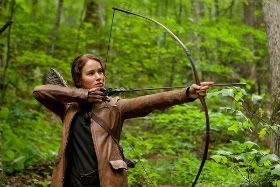 Are you a hopeful screenwriter looking for the secret formula for box office gold? Well, I think we’ve finally found it. Three words: teenagers in peril. Well, yes, it is also recommended that you throw in a trio of central characters, preferably one girl and two boys. And I suggest you set up some sort of romantic triangle between the central characters—that would really help. And the setting must be somewhat fantastical—just enough to be familiar, but just absurd enough to be unreal. You of course would have to write a book first—and make it a series, that’s a must. But, mainly, build it all around the simple idea of teenagers in deathly peril. Then you may begin to print money.
Are you a hopeful screenwriter looking for the secret formula for box office gold? Well, I think we’ve finally found it. Three words: teenagers in peril. Well, yes, it is also recommended that you throw in a trio of central characters, preferably one girl and two boys. And I suggest you set up some sort of romantic triangle between the central characters—that would really help. And the setting must be somewhat fantastical—just enough to be familiar, but just absurd enough to be unreal. You of course would have to write a book first—and make it a series, that’s a must. But, mainly, build it all around the simple idea of teenagers in deathly peril. Then you may begin to print money.
First, there was Harry Potter, which was more peril, less romance. Then came Twilight, which was more romance, less peril. And now, perhaps the ultimate expression of teen angst, The Hunger Games, which is virtually no romance and all peril. And by far the most cathartic of the three.
The Hunger Games, really, has it all. Based on the first of Suzanne Collins’ trilogy of best-selling young adult books, the film, directed by Gary Ross, stays true to the novel (as much as it can) and features characters we root for in a premise we despise, triggering basic human emotions such as fear, loathing, compassion and excitement. Director Ross, however, does a good job of reining in his characters’ emotions and focusing instead on the overriding theme of this film (and Collins’ books): survival. And this is why the books and the movie succeed.
If you don’t know the premise of The Hunger Games, prepare yourself. Set in a futuristic, post-apocalyptic North American country called Panem that is under authoritarian rule, The Hunger Games is about an annual event meant to discourage civil unrest. Every year, two teenagers, one boy and one girl, from each of the 12 Panem districts are randomly chosen to play in the annual Hunger Games, which is a fight to the death. Twenty-four teenagers enter an arena, and one emerges alive. Oh, did I mention this was all nationally televised? Yes, it’s the ultimate reality competition. And you thought Survivor was stressful.
It may sound horrible, but what made the books work so well (yes, I couldn’t put them down) wasn’t the idea of kids killing each other (which they do), instead it was the character-driven story. Much like The Girl With the Dragon Tattoo, which builds an upsetting narrative around a dynamic, charismatic central heroine, so does The Hunger Games, which is centered on the character of Katniss, played in the film by Jennifer Lawrence. Katniss is strong, independent, tough, and confident. And, like Lisbeth Salander, she is a survivor. And that is why you root for her.
And it is Katniss that makes The Hunger Games worth watching. Lawrence’s performance is virtually emotion-less, which is perfect. The experience of this film is seeing a character we care about thrust into a situation where she must either kill or be killed—there is no choice in the matter. The Hunger Games never veers from the central premise that these kids are in a deadly game. From the first shot, the seriousness of the situation is established and that intensity is matched, shot for shot, by Lawrence’s mood and emotional restraint. That’s not to say there aren’t light moments—there have to be—but both Ross and Lawrence know that the premise must be respected or nothing else can come through.
This does make watching The Hunger Games a bit of a slog though. In keeping with the seriousness and intensity of the subject matter, Ross shoots the film with handheld cameras, creating a blurry, frenetic and sometimes irritating rawness to the movie. But the movie is about survival, and this down-in-the-mud style is understandable, and reflects the characters’ desperation.
Ross doesn’t do as well with the screenplay, which he adapted from Collins’ book. Much like Titanic, the setting and premise are the stars here, so you can tell that not much care went into the dialogue, which suffers from over-simplicity and occasional corn. But even so, the actors here all do well with what they’re given and the cast that surrounds Lawrence is all first-rate. Josh Hutcherson, who plays Peeta, Katniss’ fellow tribute from district 12, is earnest, smart and endearing, providing good contrast to Lawrence’s icy and withdrawn Katniss. The real treat here is Woody Harrelson, who plays Katniss and Peeta’s mentor, Haymitch. Harrelson is the comic relief, for lack of a better word, but he is quite subtle and gives a solid foundation for our heroes to lean on. I was disappointed a bit by Lenny Kravitz, who could have played Katniss’ costume designer with a little more texture, but again, I appreciated the low-key approach taken by pretty much everyone in the cast, even when the text may have called for outlandishness.
Overall, The Hunger Games the movie isn’t nearly as captivating and engrossing as The Hunger Games the novel. But the movie does well enough to deliver an entertaining two hours that, despite the stomach-turning premise, does well to communicate its theme and bond you to characters that you know you’ll see again. This is only the beginning.
